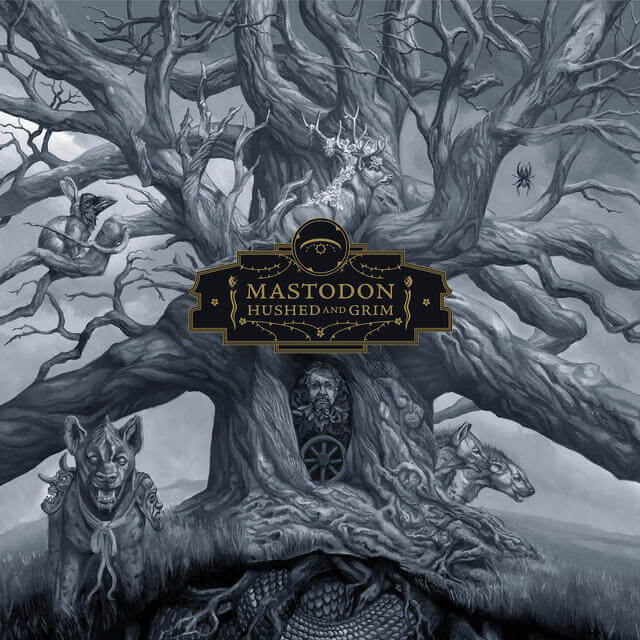
‘Hushed & Grim’ Album Artwork
Written by Eric Sperrazza
Few bands come to mind that has truly thought-provoking and intelligent themes and lyrics surrounding their work to force its listeners to lean in, think, and even research to find deeper levels of understanding. Iron Maiden, Rage Against The Machine, and Public Enemy are some of the gold standard musical provocateurs of suggestion.
But, in today’s age, the Georgia quartet, Mastodon, has carved out a niche as being a band that references everything from classic novels to metaphysical interpretation. The beauty of Mastodon is that beneath its deep-cutting power chords and adrenaline-fueled backbeats lie stories, emotions, curiosity, and wonder.
Hushed & Grim, the 8th and latest installment of their discography, is a different kind of journey, however. In September of 2018, Mastodon‘s longtime manager and friend, Nick John, had passed away from cancer. Although loss has always been touched upon in the Mastodon discography, this latest LP would be different; this would be a celebration of Nick John, a dive into the mythology of the afterlife, and a therapy of sorts for a band who lost their biggest fan and leader.
Immediately, you can feel a darker and sadder tone with the album, just holding it in your hands. The cover art alone represents a mythos that the spirits of the dead go on to live in trees. On the said cover is a tree with a face peeking out from the center; the face that represented Nick John, himself.
As you delve into the content of the record, the first track, “Pain With an Anchor,” sets the stage. You will be a phantom witness, listening to this band reconcile death and pay solemn tribute, all at once. Songs like “The Crux,” tear at your heartstrings, unrelentingly, making you feel something deeper than simply progressive metal. Lyrics pull you into the deep water mental state of Mastodon like “Your presence fades into a memory. Underneath a cloud of silence, your journey into the rift. Will time defy the weight of you leaving us?”
Two more favorite cuts on this album would be “The Beast” and “Had It All.” You feel like you are hearing a conversation with yourself self in both songs. The “beast” in question, is a wonderful metaphor of grief you try so hard to move on from and, with a simple thought, a random thought, that the life you settled into and the people therein are no longer, the battle rages on, once more.
This is a powerful song that still haunts my head with verses like, “The way things used to be. Find a better way to get back home. Reaching for something new that’s just not there anymore, ’cause you know that it’s gone.” With “Had It All,” the repeated chorus galvanizes the notion that you will make it to the other side of sadness as lead singer, Eric Saner, echoes from the far corners of your speakers, with “You had it all. Tomorrow’s never fine. The peace we lost in ourselves is never found. You’re gonna make it”
The crescendo of this experience is the final track on the record, “Gigantium.” There is a thinly veiled positivity as a promise is forged to never forget the ones we lose and to always keep their memories close as foundation blocks for a new day and new adventures to come. I could not think of a more uplifting love letter to reconciliation with yourself to move forward past a dark trauma.
Hushed & Grim is a game of chutes and ladders through the many stages of grief. From the darkness to the false starts and finally to that first step forward to a brighter day. No stranger to loss, myself, this record was rife with prolific imagery that resonated with my own experiences in dealing with death. From the powerful energy of the music, the force-fed words spun around the room and the snapshots into the mind of someone experiencing these permutations of resolve, listening was one of those moments you hope for in your music; a stumble into a mirrored image of your own thoughts and feelings to let you know you are not alone; to let you know you are going to be okay.
I would stop short of saying this album should be required listening to those suffering through the sadness of a death in their lives but, much like other albums in their storied career, either you “get it” or you don’t. To paraphrase the Wesley Snipes movie, White Men Can’t Jump, there are people that listen to Mastodon and those that HEAR it. There is a difference and this album is wildly consoling to those that can hear it.
Connect with Mastodon







